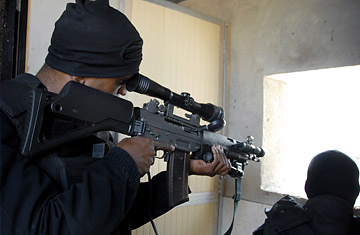
India's National Security Guard commandos take positions from an adjoining building of Nariman Bhawan in Mumbai
For the past several months, bombings have rattled the image of an India industriously humming toward prosperity. Beginning about two years ago, they have occured with increasing frequency: about a dozen such attacks have pockmarked India's largest cities, from Delhi and Jaipur to Bangalore and Guwahati. And so when the alarms went out on Wednesday night, it looked like Mumbai was being hit by another one of those attacks. The modus operandi was similar: simultaneous blasts in heavily populated areas. But this time, the attack was different.
Indeed, the assault only seemed to grow in frenzy, scope and intensity as time passed. Less that two hours after the first reports of firings and explosions, which came at about 10 p.m. local time, it soon became clear that instead of just crude bombs left on bicycles, scooters and cars, this attack used the whole arsenal: grenades, AK-47s, rifles and a car bomb in a taxi that exploded on the highway headed to the city's international airport. And unlike previous attacks, which have hit mainly Indians in popular, crowded markets, this one appeared to have targeted foreigners and the posh hotels they frequent. Two of the city's landmark properties — the Oberoi and the Taj Hotel — were under siege. The grand dome of the Taj caught fire, masked in a purple haze, after terrorists set off an explosion on the roof as police closed in on them. About 300 troops, sent in by the central government, have also surrounded the Oberoi.
A British national, a man in his 30s, who was having dinner inside the Oberoi Hotel, one of the city's poshest, told the Times Now television station that two young men — in jeans and T shirts — came in brandishing AK-47s and rifles, singled out those carrying British and American passports and ordered them to the roof. "We went on the 18th floor, it became very smoky, we escaped. Just two of us," said the British man, who was not identified. As of 2 a.m. local time, several of the hostages were still being held, with dozens of Indian commandos surrounding the hotel.
A member of Parliament, Krishna Das, who was interviewed from inside the Taj Hotel, reported that two men also entered that hotel's restaurant and started firing, but did not take any hostages. Bombs were reported in at least seven sites in Mumbai, and, by Thursday afternoon, more than 100 people had been reported killed and nearly 300 injured. Eleven police had been killed, including the city's anti-terrorism chief. Several suspects had been shot by police. It is not yet clear how many attackers were involved in the assault.
The hostage situation remains very unclear. There are believed to be some 25 civilians trapped in the Taj, 40 at the Oberoi hotel, and perhaps 10 in the Colaba Market neighborhood. But in each place some of those people may be trapped rather than hostages. Authorities have cordoned off each of the locations. Much of the normally busy city is deserted, with shops and businesses closed.
The attacks come at a moment when Mumbai has become a communal tinderbox and terrorism has become one of the biggest political issues in the country. The ruling Congress Party has drawn flak for allegedly failing to take a strong line on terrorism, but the states ruled by the Bharatiya Janata Party, the leading opposition party at the center, have also been targeted.
Late last month, 10 arrests unearthed what appeared to be a possible Hindu extremist terrorism network, with ties to the BJP. But, for the most part, security agencies and analysts have blamed jihadi groups for the recent terrorism attacks. And the simultaneous bomb blasts on Wednesday — similar to previous radical Islamist attacks — immediately led most observers to suspect the jihadis once again. For years, India blamed Pakistan's intelligence services for terrorism attacks; then the usual suspects became the Harkat ul Jihad Islamia (based in Bangladesh) and Students Islamic Movement of India, a group that has been banned. This summer, a new group emerged, Indian Mujahideen, claiming responsibility via e-mail for several attacks and stressing that their members and grievances were homegrown. A group called Deccan Mujahideen, previously unknown, has also sent an e-mail claiming responsibility for Wednesday's attacks. That claim cannot yet be confirmed.
In 1993 Mumbai was hit by a series of bombs that killed nearly 300 people. Those were allegedly detonated at the behest of local gangsters in retaliation for anti-Muslim violence by India's majority Hindus. Those gangsters, including Dawood Ibrahim, are now believed to have escaped India and to be living in the Pakistani city of Karachi.
As the debate over terrorism continues, various parties have been trading blame. The BJP has accused the Congress of cooking up charges against the arrested Hindu right-wingers, while the Congress has been accusing the BJP of playing a double-game of pointing fingers at the Congress while lending a hand to Hindu-fundamentalist terrorists. Mumbai has been a focus of the tension between the parties, as several of the so-called Hindu terror arrests have taken place in or near the city. Perhaps the size and scale of this most recent attack will force the country's political leaders to finally push through a long-shelved proposal to co-ordinate intelligence on terror incidents between the states and prevent a repeat of Wednesday's bloody spectacle.
— With reporting by Madhur Singh / New Delhi
